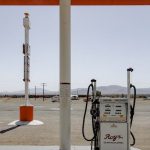The Russian invasion of Ukraine has presented a window of opportunity for North Korea, which has taken advantage of this window by strengthening its ties with Moscow and becoming one of Russia's most outspoken allies.
Pyongyang plans to dispatch laborers to the districts of eastern Ukraine controlled by Russia, namely Donetsk and Luhansk, in order to furnish the Kim regime with the much needed foreign cash. In spite of the fact that North Korea is working toward acquiring new capabilities like hypersonic missiles, Russian President Vladimir Putin has pledged to supply allies with cutting-edge weapons and military equipment. In addition to this, Moscow has the ability to expand the trafficking of aid and food over international borders, and it may utilize its position on the United Nations Security Council to prevent any further tightening of sanctions against North Korea.
In March, North Korea was one of only five countries that voted against a United Nations resolution urging that Russia cease its invasion of Ukraine. The North Korean government attributed the underlying cause of the conflict to the "hegemonic strategy" of the United States and its allies. In July, North Korea was one of the first countries to recognize Donetsk and Luhansk as separate republics. As a result, Kiev severed diplomatic ties with Pyongyang as a direct result of this development.
After the deadline in 2019, the United Nations put an end to the practice of employing North Korean workers overseas, thereby cutting off the Kim regime's primary source of revenue from outside the country. Prior to the recent crackdown, Russia was one of the largest countries in the world to house North Korean employees, with a total of around 30,000 such individuals. Workers from North Korea were appealing to Russian companies because their pay were marketed as being 30% to 50% lower than those of other migrants in the region, who mainly came from Uzbekistan and Kyrgyzstan. This made North Korean workers appealing to Russian companies.
It is possible that Russia will continue to assert that Donetsk and Luhansk are autonomous areas that are exempt from international sanctions due to the fact that they do not hold membership in the United Nations. Earlier this month, North Korea's ambassador to Russia shared at a meeting with a Donetsk envoy plans to send laborers to the region as soon as the Kim regime's Covid-19 border restrictions are eased.
During an interview with the Russian newspaper Izvestia that took place the previous month, the Russian Ambassador to North Korea, Alexander Matsegora, stated that workers from North Korea could assist in the restoration of facilities in Donetsk that were damaged as a result of the fighting in the Ukraine conflict.
According to Mr. Matsegora, North Koreans are also interested in obtaining replacement parts manufactured in the region and rebuilding their industrial facilities. Mr. Matsegora stated this information. The possible transactions are a precursor to additional measures that would breach UN sanctions.
Pyongyang has rejected the offer made by the Biden administration to meet with North Korea at any moment, and the United States is disappointed. Since they last held official nuclear discussions, the two countries are approaching three years since their last meeting.
The developing partnership between Moscow and Pyongyang has reached the highest heights possible. The state media in Pyongyang has reported that Russian President Vladimir Putin and North Korean Supreme Leader Kim Jong Un have been in correspondence since the beginning of this month. Mr. Putin expressed a desire to broaden relations, while Kim Jong Un stated that bilateral ties had reached a new high in the common front for frustrating the hostile forces' military threat and provocation. Hostile forces is a term that is frequently used to describe the United States of America and its allies.
After the discovery of Covid-19 in the country that borders North Korea, the Kim administration was one of the first to close up its borders at the beginning of the year 2020. The poor nation of North Korea was obliged to reopen its borders briefly earlier this year for a limited amount of cross-border economic activity; however, an epidemic caused the country to close its borders once more.
Despite this, Mr. Kim announced last month that a win in terms of public health has been achieved and offered to ease some of the restrictions from their highest levels. The Sino-NK research group is a website that focuses on China and North Korea. Once cross-border trade continues, Russia could unlawfully provide North Korea with coal or export barred luxury goods, according to Anthony Rinna, an expert on Russia-North Korea relations at the website. Rinna is employed by the Sino-NK research group.
In 2019, Mr. Putin finally had the opportunity to see Mr. Kim in person for the first time, just a few short months after the North Korean leader attempted but ultimately failed to negotiate a nuclear agreement with the previous President of the United States, Donald Trump, in Vietnam. At a recent security conference, Vladimir Putin made a commitment to "consistently strengthen the national armed forces and other security structures." He did not mention North Korea by name, but he did say that Russia would do this by supplying its allies with cutting-edge weapons and other forms of military hardware.
The North Korean nuclear facility that is currently the most important is located in Yongbyon, which was partially built with assistance from the Soviet Union. The North Korean missile development program benefited from the assistance of Russian experts who gave North Korea with fuel technology in the 1990s. The liquid-propellant engine that is used during intermediate and intercontinental missile launches is based on technology that was developed by the Soviet Union, according to a report that was published in 2017 by the International Institute for Strategic Studies, which is a think tank based in London.
The preceding is a summary of an article that originally appeared on The Daily Cable.




